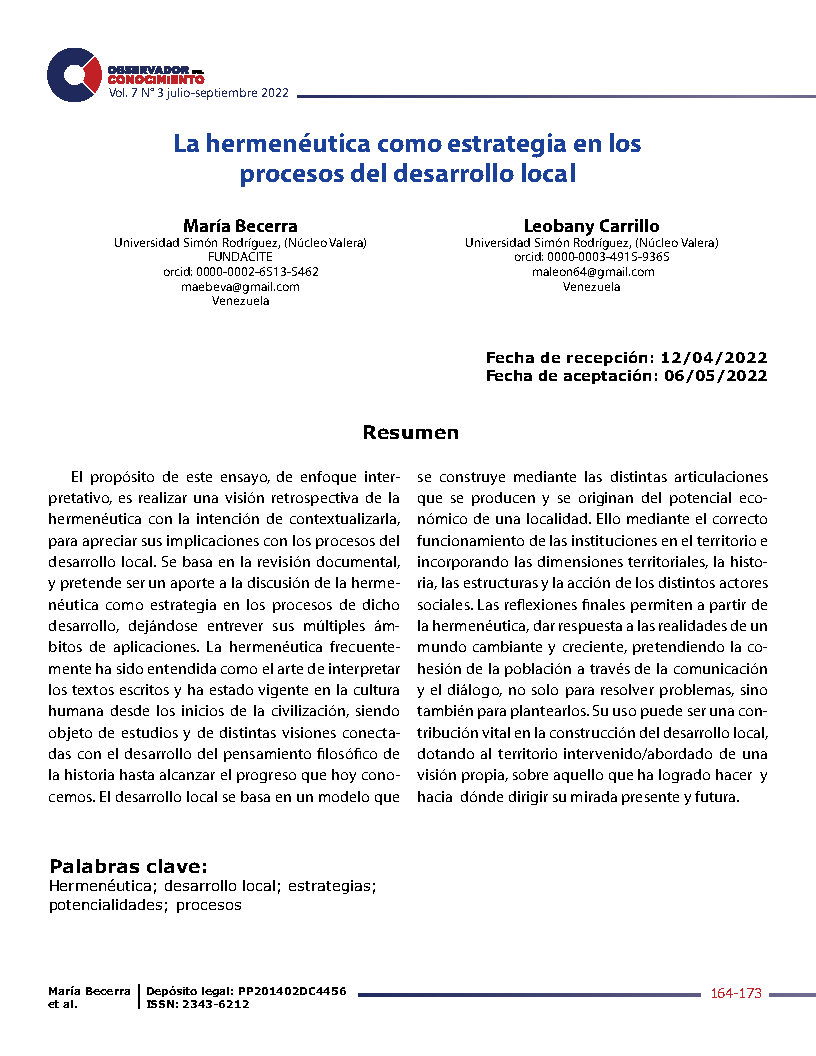Hermeneutics as a strategy in local development processes
Keywords:
Hermeneutics, local development, strategies, potentialities, processesAbstract
The purpose of this essay, with an interpretative approach, is to make a retrospective view of hermeneutics with the intention of contextualizing it, in order to appreciate its implications with local development processes. It is based on a documentary review, and intends to be a contribution to the discussion of hermeneutics as a strategy in the processes of such development, and to provide a glimpse of its multiple fields of application. Hermeneutics has often been understood as the art of interpreting written texts and has been in force in human culture since the beginning of civilization, being the object of studies and different visions connected with the development of philosophical thought in history until reaching the progress we know today. Local Development is based on a model that is built by means of the different articulations that are produced and originate from the economic potential of a locality. This is done through the correct functioning of the institutions in the territory and incorporating the territorial dimensions, the history, the structures and the action of the different social actors. The final reflections allow, based on hermeneutics, to respond to the realities of a changing and growing world, aiming at the cohesion of the population through communication and dialogue, not only to solve problems, but also to raise them. Its use can be a vital contribution in the construction of local development, providing the intervened/addressed territory with its own vision of what it has managed to do and where to direct its present and future gaze.
Downloads
References
Alburquerque, F. (2007a). Teoría y práctica del enfoque del desarrollo local. Revista OIDLES, 1, (0), pp. 39 – 61. Junio 2007. Recuperado en: http://eumed.net/rev/oidles/00/Alburquerque.htm.
Alburquerque, F. (2007b). Cambio estructural, desarrollo económico local y reforma de la gestión pública. CEPAL/ILPES, Naciones Unidas. Santiago de Chile.
Arocena, J. (2018). Lo global y lo local en la transición contemporánea. Cuadernos del Claeh, N° 78-79, Montevideo. Recuperado en: https://nanopdf.com/download/lo-global-y-lo-local-en-la-transicion-contemporanea_pdf
Gadamer, H. (1993). Verdad y método. (Tomo I). Salamanca: Sígueme.
Gallicchio, E. (2003). El desarrollo económico local: Estrategia económica y de construcción de capital social. ECA: Estudios Centroamericanos, 58 (660), 1003-1013. Recuperado en: http://doi.org/10.51378/eca. v58i660.5426.
Husserl, E. (2019). Textos Breves (1887-1936). Coord.: Agustín Serrano de Haro y Antonio Zirión Quijano Salamanca: Sígueme. Daimon Revista Internacional de Filosofía, (84), p.p. 255-259. Recuperado en: https://revistas.um.es/daimon/article/view/435941.
Millán, M. (2003). La iniciativa comunitaria LEADER en el desarrollo local del noroeste murciano. Tesis doctoral no publicada. Murcia: Universidad de Murcia.
Pérez, G. (2000). Investigación cualitativa. Retos e interrogantes. Madrid: La Muralla, España.
Quintana, J. (1980). Sociología de la educación. La enseñanza Como sistema social, segunda edición. Barcelona: Editorial Hispano Europea.
Ricoeur, P. (1995). Teoría de la interpretación. Discurso y excedente de sentido. Universidad Iberoamericana: Siglo XXI Editores.
Schleiermacher, F. (2000). Sobre los diferentes métodos de traducir. (Traducción de Valentín García Yebra), Madrid-España: Editorial Gredos.
Sen, K. (2000). Desarrollo y libertad. Argentina: Editorial Planeta.
Vázquez, A. (1986). El cambio del modelo de desarrollo regional y los nuevos procesos de difusión en España. Estudios Territoriales, 20, pp. 87-110.
Vázquez, A. (1988). Desarrollo local. Una estrategia de creación de empleo. Madrid: Editorial Pirámide.

Downloads
Published
How to Cite
Issue
Section
License
Copyright (c) 2022 http://creativecommons.org/licenses/by-nc-nd/4.0/

This work is licensed under a Creative Commons Attribution-NoDerivatives 4.0 International License.







